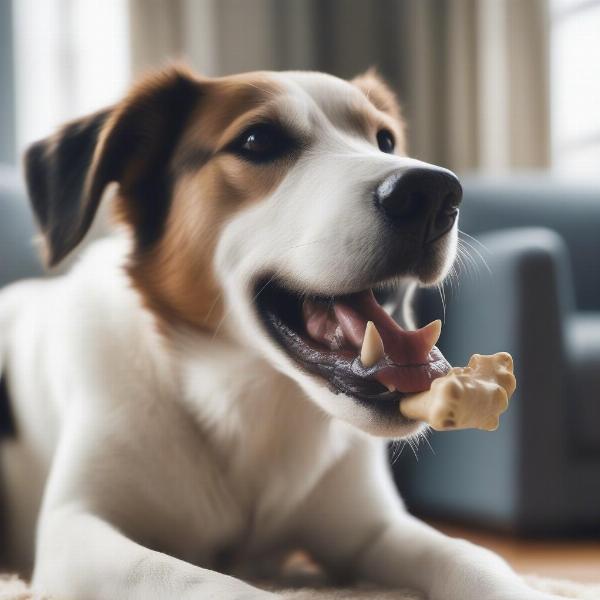Choosing the right chew for your dog can be a daunting task. While rawhide has long been a popular choice, many pet owners are now seeking safer and healthier alternatives. Dog bones without rawhide come in a wide variety of materials, textures, and flavors, ensuring there’s a perfect chew for every dog’s needs and preferences. This article will explore the potential dangers of rawhide and delve into the world of alternative dog chews, helping you make informed decisions to keep your canine companion happy and healthy.
 Dog chewing a non-rawhide bone
Dog chewing a non-rawhide bone
Rawhide can pose several risks to dogs, including choking, digestive blockages, and bacterial contamination. The manufacturing process often involves harsh chemicals, which can be harmful if ingested. Furthermore, rawhide can be difficult for some dogs to digest, leading to stomach upset and other digestive issues. For these reasons, many pet owners are turning to alternative chew options.
Exploring Rawhide-Free Chew Options
Luckily, there are plenty of dog bones without rawhide available on the market. These alternatives offer a safer and often more nutritious way to satisfy your dog’s natural chewing instincts. Some popular options include:
-
Dental Chews: Designed to promote dental health by scraping away plaque and tartar, these chews come in a variety of shapes and sizes. They are often flavored to entice even the pickiest of eaters.
-
Natural Bones: Bones from animals like cows, bison, or deer can provide a long-lasting and satisfying chew. Look for bones that are appropriately sized for your dog and avoid cooked bones, which can splinter and cause injury.
-
Synthetic Chews: Made from durable materials like nylon or rubber, these chews are designed to withstand even the most aggressive chewers. They are often flavored and textured to keep dogs entertained.
-
Treat-Filled Chews: These combine the fun of a chew with the deliciousness of a treat. They can be filled with peanut butter, cheese, or other dog-friendly fillings, providing a rewarding and engaging chewing experience.
Choosing the Right Chew for Your Dog
Selecting the appropriate chew depends on several factors, including your dog’s size, age, chewing habits, and any allergies or sensitivities. For aggressive chewers, durable synthetic chews or large natural bones may be the best option. Puppies and senior dogs may benefit from softer chews that are easier on their teeth and gums. big dog chew toys offer great options for larger breeds.
Considering Your Dog’s Needs
“It’s crucial to consider your individual dog’s needs when selecting a chew,” says Dr. Emily Carter, a veterinary dentist. “A chew that is too hard can damage teeth, while one that is too soft may not provide enough stimulation.”
Always supervise your dog when they are chewing on any object, and discard any chews that become worn or damaged. If you’re unsure which chew is right for your dog, consult with your veterinarian. They can provide personalized recommendations based on your dog’s specific needs. For those interested in natural chews, you can explore options like antler chews dogs or even understand the risks associated with raw chicken bones for dogs.
Conclusion
Providing your dog with appropriate chew toys is essential for their physical and mental well-being. By choosing dog bones without rawhide, you can offer a safer and more enjoyable chewing experience. Remember to consider your dog’s individual needs and always supervise their chewing sessions. By making informed choices, you can help your furry friend stay happy, healthy, and entertained. You might also be interested in nylabone safe for dogs for a safer synthetic option. For those who want to understand more about bones in general, raw dog bones can provide additional insights.
FAQ
- What are the best rawhide-free chews for aggressive chewers? Durable synthetic chews or large, dense natural bones like antlers are good choices.
- Are dental chews effective at cleaning my dog’s teeth? Yes, they can help scrape away plaque and tartar, but they shouldn’t replace regular brushing.
- What should I do if my dog swallows a piece of a chew toy? Contact your veterinarian immediately.
- Can puppies chew on natural bones? Yes, but choose bones specifically designed for puppies, which are softer and less likely to splinter.
- How often should I replace my dog’s chew toys? Discard any chews that become worn or damaged.
- What are some signs that my dog is enjoying their chew toy? They will be actively engaged, chewing contentedly, and showing signs of relaxation.
- Are there any hypoallergenic chew toys available? Yes, look for chews made from hypoallergenic materials like sweet potato or rice flour.
ILM Dog is a leading international website dedicated to providing expert advice and resources on all aspects of dog care and wellbeing. From breed selection to health, training, nutrition, grooming, and product reviews, ILM Dog offers a wealth of knowledge for both new and experienced dog owners. We focus on providing practical, reliable information to help you make the best decisions for your canine companion. For expert guidance on all your dog-related needs, contact us at [email protected] or call us at +44 20-3965-8624. Visit ILM Dog today!